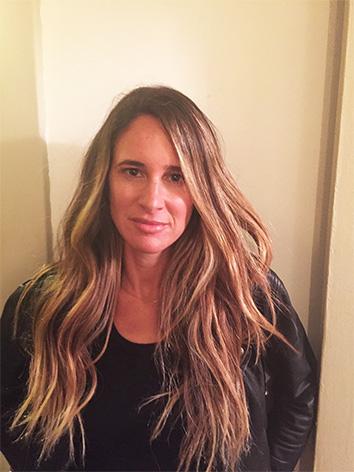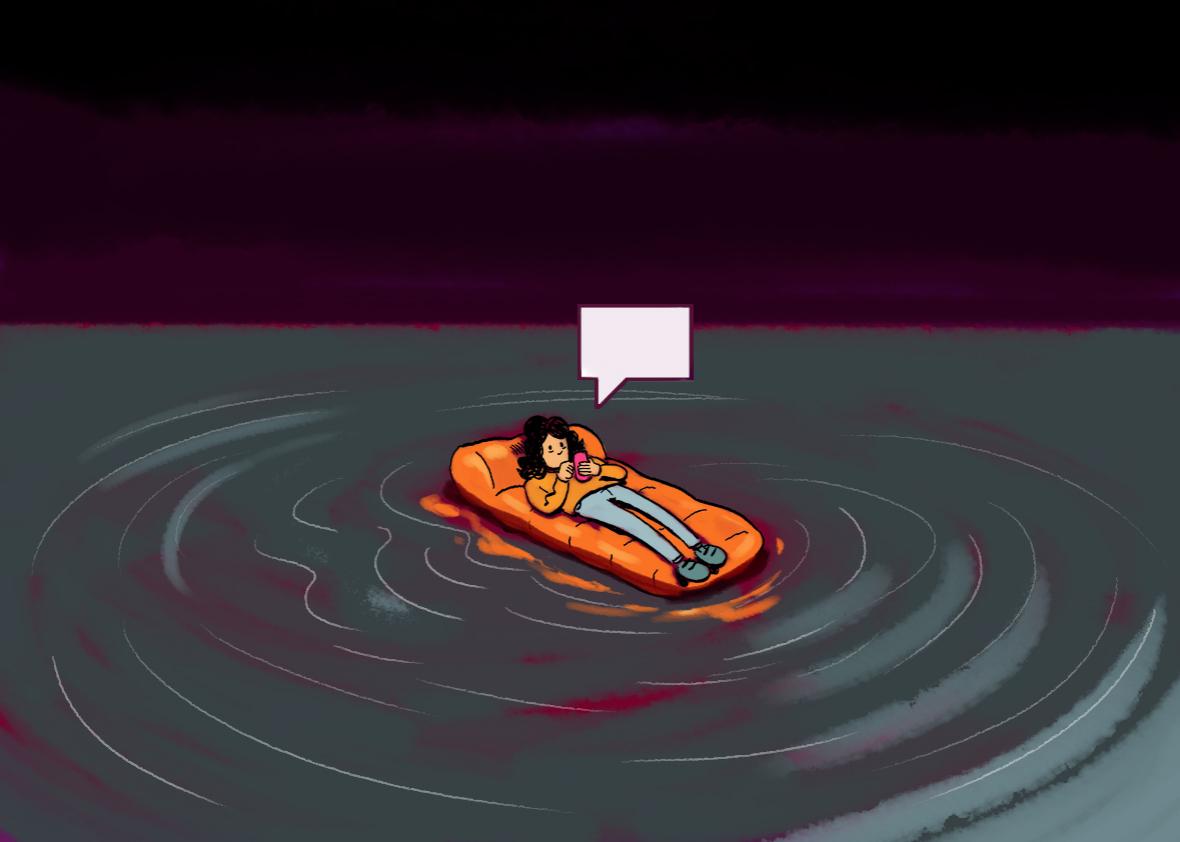Melissa Broder is afraid of death. Not necessarily “death,” the eventual, eternal state of nonbeing, but death, the act: the exact moment when she stops breathing and life’s “isness” becomes isn’tness in terribly short order. Broder thinks about this moment with compulsive frequency. It precludes successful therapy sessions—her therapist is also going to die, so that’s no help. It consumes her in yoga class—you won’t be breathing when you die, “so if you spent your whole life focusing on your breath you’re kind of fucked.”
Poet, essayist, and recently unmasked social media phenom Broder has described her new essay collection So Sad Today as a “catalog” of every single thing that she is ashamed of. The list—from infancy to adulthood, from head to toe, inside and out—is extensive. Broder started experiencing symptoms of an anxiety disorder at age 12, but the trouble really started before that, she claims. The doctor who delivered her told her mother that newborn Broder was pretty, and she writes that instead of accepting the compliment, she spent the rest of her life measuring herself against it and losing. The other babies were hotter, her low self-esteem and early-onset anxiety led her to stress-gorge on milk, and before long she let herself go completely, eating her own snot behind a “handshield” despite judging looks from her schoolmates at story hour. Broder continued to nurture a destructive relationship with consumption: She binge-ate as a child, developed an eating disorder as a teen, and ingested mass quantities of drugs and alcohol in college. After she got sober at 25, she still sought constant fulfillment from softer addictions such as Twitter likes and the online dating apps that fuel her unrealistic romantic fantasies. This endless need to fill herself and seek validation, Broder argues, is a natural response to being born. It is unethical and absurd to her that people are brought into the world without their consent.
Broder’s heightened morbidity is at once wise and inseparable from her mental illness. She suffers from depression and debilitating panic attacks that make the world appear hyperreal: People are nightmarish, plastic; violent death is imminent. In her book, which includes a few pieces adapted from her Vice column and several new ones, Broder chronicles her battle with sadness in an addictively wry voice that may inspire you to crawl into your own hole of self-aware self-hate and laugh at the cruel madness of it all from within. Indeed, Broder’s public expression of her private torment has propelled her to something of a doomsday rock star on Twitter. There, she delivers her self-immolating ruminations in seemingly bottomless, craveable doses that read like suicidal fortune cookies. “if i can’t torture myself about it i don’t want to be involved” reads one expression of her signature existential neuroticism. “it’s weird that cheerios exist and we all die” reads another.
Based in Los Angeles, Broder set up the account in 2012 under the anonymous moniker @SoSadToday while working on the social media team at Penguin Random House and writing poetry on the side. Twitter became a therapeutic outlet where she could view her disease at a distance—a place to poke fun at her ever-present emotional volatility (“feeling very at ease jk”), her cosmic pessimism (“everyone is doing the best they can, which kind of makes it worse”), and her tendency to interpret personal resignation and tragedy in the mundane (“a potato just told me not to have children”). Ignited by responses from celebrities like Miley Cyrus and Katy Perry, Broder has amassed 340,000 followers.
So Sad Today is a kind of memoir, expanding on the real-life romantic disappointments that inspired tweets like “i hate you text me,” “let’s make a deal that i’ll get over you and you’ll think about me every day,” and “sex tip: cry during it.” These messages constitute the tonal pillar of @SoSadToday; they so seem to perfectly capture the self-absorbed abasement of modern hookup culture that Broder’s work has achieved cult status on the so-called “Sad Girl” internet. The New Yorker’s Haley Mlotek attributes Broder’s popularity to these “stylized expressions of feminine despair” and counts her book among the wider influx of empowered self-loathing works spearheaded by writers like Sheila Heti and Lena Dunham. It is inevitable that Broder should be categorized in this way—she writes candidly about her fear of rejection, her disaffecting sexual encounters, and the vomit fetish she developed at a young age and typically keeps secret from her intimate partners.
But to classify So Sad Today as the latest popular entry in a wave of confessional, feminist lit is to undersell its grander preoccupation with the horror and the humanity of the depressive mind. While Broder aligns herself with and agonizes over distinctly female issues, her gendered angst and healthy righteousness routinely collapse into the extremities of her mercurial mental state. She feels judged by men but also, inexplicably, by the universe at large: “I feel like plants, babies, trees, the ocean, animals, and the moon don’t like me.” Broder, who takes an SSRI to manage her panic attacks, has also sought solace in irony—mocking the way that her spirits latch onto any personal, worldly, or philosophical worry and plunge sharply downward. Her tweets regularly employ the lexicon of pop empowerment speak with a cynicism meant to dismiss sexual politics as window dressing for mortality: “i sexually identify as a vague sense of impending doom;” “maybe she’s born with it, maybe she never asked to be born.” What Broder fears the most is that her depression really is revealing some eternal truth about human connectedness. That body image and relationship woes and the meanings we construct around them are empty calories—pills we swallow to keep from thinking about how sad everything actually is.

Lord Byron
Like Atlantic editor Scott Stossel’s investigation into his own struggle with panic, Broder’s memoir dredges up centuries-old attempts to pin down the reasons—and solutions—for anxiety and depression. Medical approaches to anxiety in particular are complicated by the variation and degree of patients’ experience and the fact that anxiety can emerge as one of a cluster of symptoms originating from underlying depression. On the whole, depression studies are still inching toward answers. Researchers only recently isolated the protein FGF9 found in excessive quantities in individuals with depression, which they believe could lead to dramatically improved treatment.
Diagnosed with generalized anxiety disorder and after spending years in therapy, Broder didn’t realize that anxiety could be a symptom of another neurological problem until she visited a lady shaman on the Lower East Side of Manhattan after a particularly bad bout of attacks. Broder wasn’t too sold on the archangel the shaman enlisted to exorcise evil spirits, but the shaman also told Broder that her panic attacks could arise from depression. She continued to take antidepressants and see her therapist, but she also began noticing that in her hyperbolic worrying, she was trying to dam an “ocean of sadness” inside her. “I always imagined that something was supposed to rescue me from the ocean,” she says. “But maybe the ocean is its own ultimate rescue—a reprieve from the linear mind and into the world of feeling.” She resolved to jump in. She started the @SoSadToday account.
How should we feel when a person’s pain makes us laugh? Despite the revelation that her emotion and humor resonate with so many, Melissa Broder roundly rejects the dangerous sentiment that a curse can be a blessing. She began sending snippets from her depressed brain into the universe at first as a means of self-medication—she realized that laughing at herself in an open forum truly helped stop her from going over the edge—before letting the world in on the joke. Still, reading Broder’s book is a reminder of how humor can spring organically from darkness—not as a result of sadness but in spite of it—and Broder is unusually gifted at harnessing its defensive power. In a passage that left me spontaneously laughing days after reading it, Broder recounts a story about her friend Lauren—a therapist who herself has anxiety disorder and gets panic attacks while on the job. Lauren once had a panic attack so severe that she made up an excuse for her and her patient to get some air and grab something to eat. “She cloaked this exodus in teaching the patient a lesson in self-care,” Broder writes. “You have to eat, she said. But in her head Lauren was like, Thank you Jesus. If they didn’t leave the room she thought she was going to die.”
Broder, who spends more time than most wondering why no one else is acting like the sinking ship we’re all on is sinking, finds a comforting hilarity in communal panic. It does not cure her depression, but it makes her feel less alone in it—it gives her the courage to keep tweeting her fears into the void. So Sad Today offers no prescription for sadness—Broder doesn’t believe that one exists. What it offers instead is the surprisingly freeing permission to look around at your own finite existence and panic just a little—to dive into despair.
—
So Sad Today by Melissa Broder. Grand Central Publishing.
See all the pieces in the Slate Book Review.
